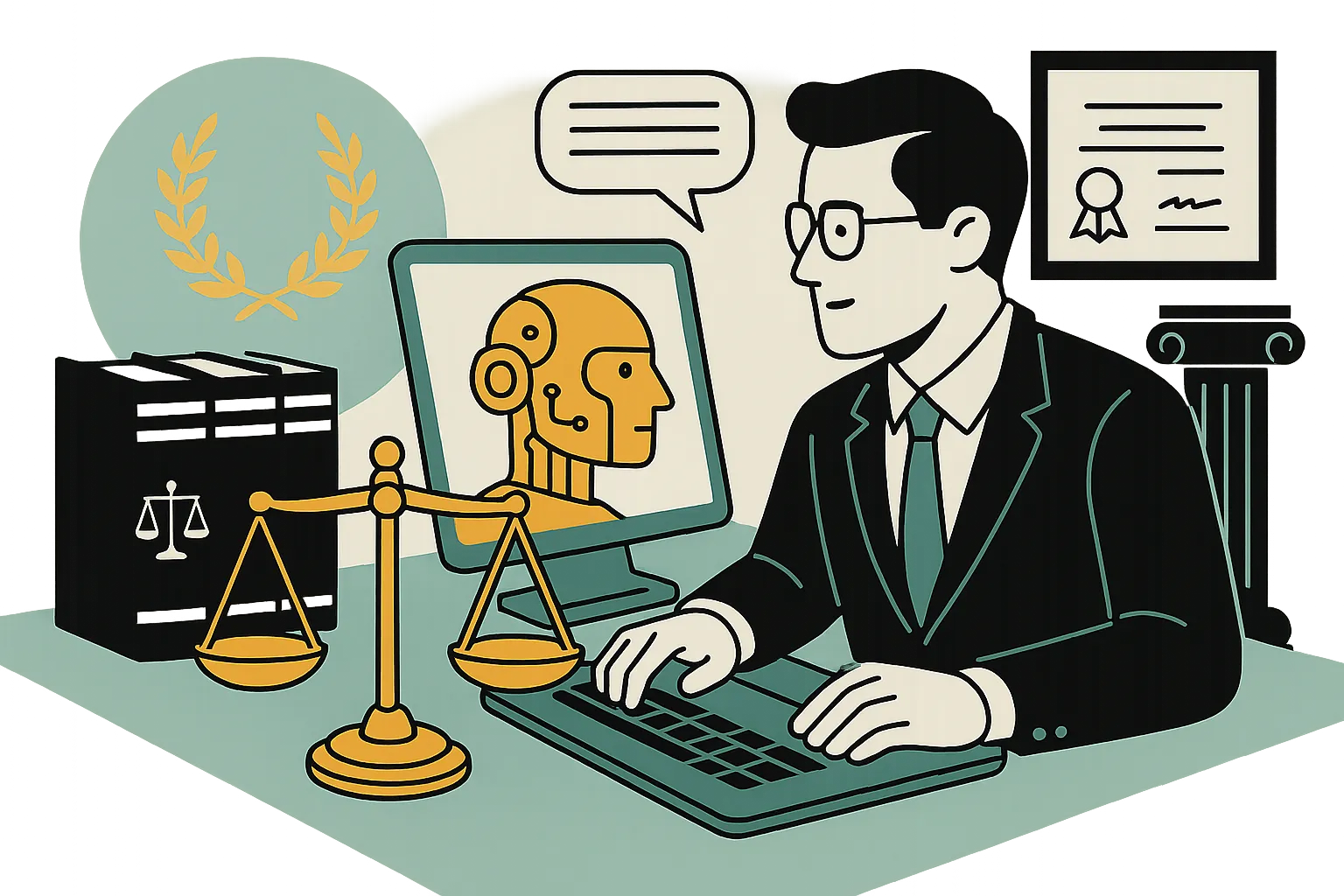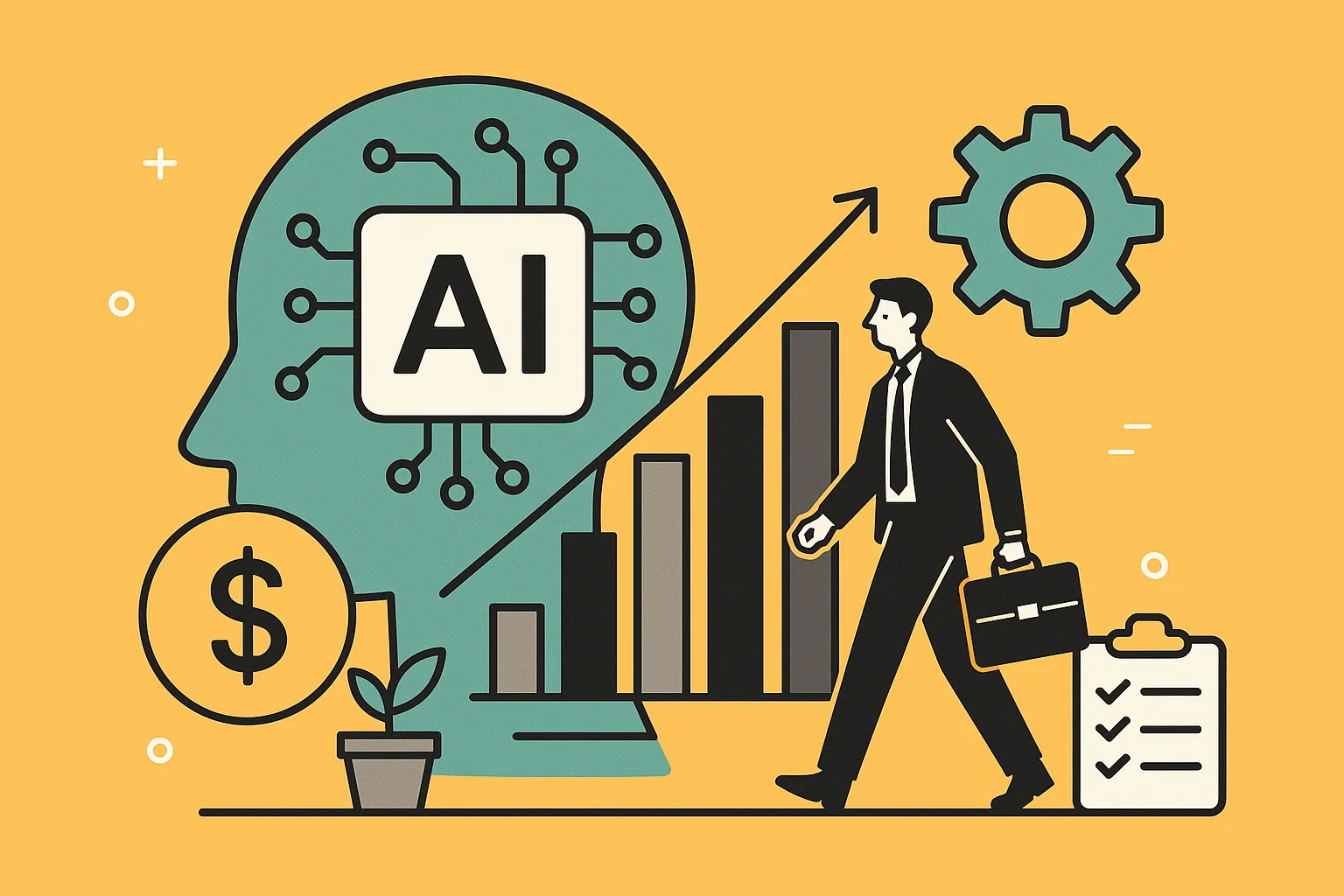Imagine adding $100,000 in new billable time per lawyer each year. What would that mean for your firm's bottom line? For a 50-attorney practice, that's a potential $5 million revenue boost without adding headcount or increasing client fees.
According to the Future of Professionals Report by Thomson Reuters, AI tools for law firms could free up 4 hours of a legal professional's time per week. For U.S. lawyers alone, this translates into 266 million hours of increased productivity—approximately $100,000 in new billable time per lawyer annually, as illustrated in the productivity chart below.
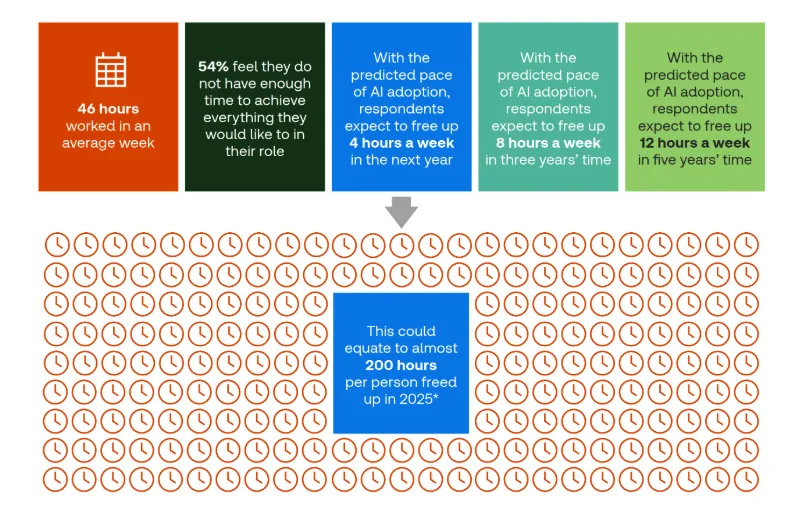
This freed-up time opens up strategic opportunities beyond mere efficiency: your attorneys can redirect their expertise toward higher-value advisory work, develop deeper client relationships, or pioneer new practice areas that differentiate your firm in a crowded marketplace.
This isn't speculative, it's happening now. Approximately 50% of law firms are already using generative AI for law firms daily, presenting an enormous opportunity to boost productivity further with specialized, custom tools tailored to legal workflows.
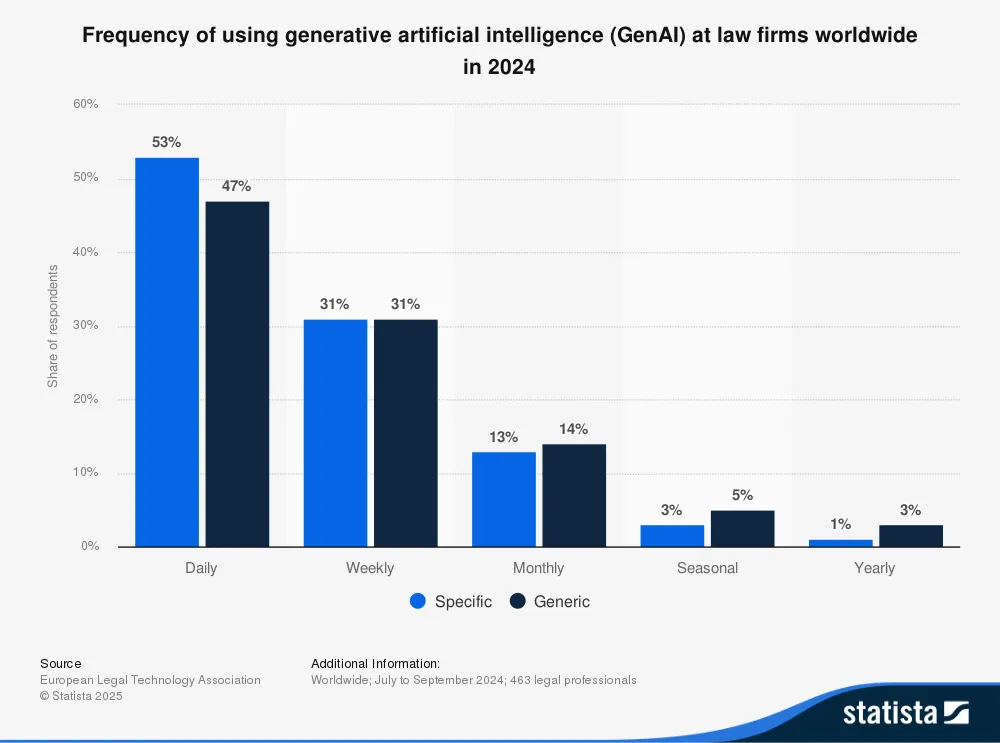
As firms begin to capture this value, a natural question emerges for both partners and associates alike: What does this transformation mean for the future of legal careers? While efficiency gains are welcome, they also prompt legitimate questions about the changing nature of legal work.
Will AI Replace Lawyers?
It's the question on everyone's mind, but data is reassuring. According to Bloomberg Law, 72% of surveyed legal professionals strongly disagree that generative AI will replace lawyers. The London School of Economics report on AI in the legal industry puts it succinctly:
"Since large parts of lawyers' jobs currently involve pattern recognition and standard form templates, law has been forecasted as one of the most vulnerable careers to technological unemployment in the face of AI. Understandably, this has led aspiring lawyers to fear that their dream jobs may become obsolete. Whilst the number of jobs for full-time human lawyers is expected to drop, there seems to be a general consensus that AI will change, rather than replace, the legal profession."
The key takeaway? AI won't replace lawyers—but it will replace law firms that don’t adapt. Forward-thinking firms are already embracing AI as a way to modernize operations, elevate legal service delivery, and stay ahead in an evolving marketplace.
As a managing partner or CEO, you face a clear choice: lead the transformation or fall behind competitors who do. The firms that build a thoughtful AI strategy today will gain the capacity to focus on what truly matters—deeper client relationships, more complex and rewarding legal work, and a defensible edge in a tech-driven legal landscape.
From Insight to Implementation: 4 Steps in Your 30-Day AI Action Plan
Recognizing the potential of AI for law firms is one thing—actually capturing its value is another. Based on our work with clients across the legal industry, we've developed a four-step approach to help firms move from exploration to execution in just 30 days:
1. Conduct an AI Audit
An AI audit helps law firms pinpoint where artificial intelligence can drive the greatest returns—whether that’s improving workflows, automating routine tasks, or enhancing strategic service delivery.
Key areas include:
- Process Mapping: Identify inefficiencies in tasks like legal research, document review, contract drafting, and billing.
- Systems and Data Readiness: Assess how structured and accessible your firm’s data is across platforms.
The audit isn’t just about the technology—it reveals where intelligent automation can reduce workload and enhance value for clients. Clean, centralized data and well-defined processes lay the foundation for successful AI initiatives.
In practice, firms might use tools like AI readiness checklists, process mining software, or data quality scanners to support the audit.
To help frame the types of AI solutions you might consider, Richard Susskind’s technology grid (shown below) offers a helpful lens. It plots legal tech according to its impact—whether it supports internal operations or client-facing services, and whether its value is rooted in technology or knowledge.
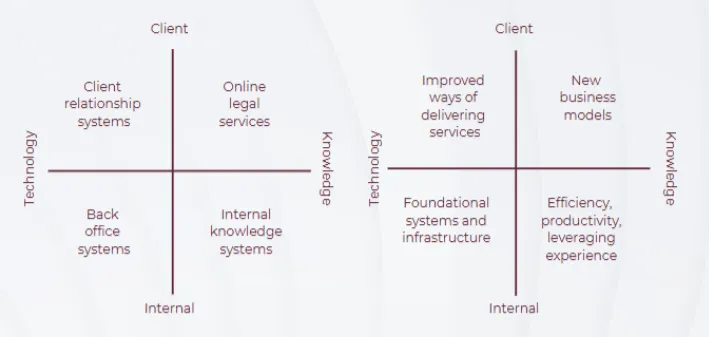
By aligning your audit findings to this matrix, you can more clearly see whether your AI focus should be on efficiency and infrastructure (e.g., automating back office or internal knowledge systems) or on transformative services and new models (e.g., client-facing tools, online legal services, or expert systems).
A well-run AI audit will surface high-ROI opportunities, expose friction points, and provide a roadmap for smarter implementation—setting the stage for measurable gains in efficiency and client service.
At Crata AI, our AI Quickstarter streamlines this process for you. It delivers a comprehensive AI audit—covering workflows, systems, and data readiness—while our legal tech experts work alongside your team to uncover high-impact, low-friction opportunities. The result: a tailored, actionable strategy in just four weeks.
2. Prepare Your Data Foundation
AI is only as effective as the data behind it. For law firms, building a structured, reliable data foundation isn’t optional—it’s the prerequisite for any meaningful AI for law firms implementation.
Start by standardizing how documents are named, tagged, and categorized. Contracts, pleadings, discovery materials, client communications—each must be properly indexed and stored in secure, accessible repositories. Inconsistent naming conventions or scattered storage can seriously limit the performance of even the most advanced AI tools for law firms.
Equally important is setting up strong data governance. Legal work demands the highest standards of confidentiality. Establish clear protocols for what types of data can be processed by AI systems, how sensitive information is protected, and where ethical walls must be maintained.
One powerful example of this in action comes from Harvey, a legal AI company that partnered with OpenAI to develop a custom case law model. Early in their development, the team realized that generic models like GPT‑4 didn’t have the depth or legal accuracy needed for complex reasoning tasks. To address this, they invested in their data foundation—curating and enriching their system with over 10 billion tokens of U.S. case law, beginning with Delaware and expanding nationwide.
“We added the equivalent of 10 billion tokens worth of case law data... Not only does the case law model not make up cases, but every sentence is actually supported with the case it’s citing.”
— Winston Weinberg, Co-Founder of Harvey
This investment paid off: their model delivered an 83% increase in factual accuracy and was preferred over GPT-4 by attorneys in 97% of test cases. The takeaway? Structured, high-quality legal data isn’t just helpful—it’s what unlocks real performance for AI automation tools for legal teams and advanced contract review AI systems.
3. Train Your People (Not Just Your Models)
Technology without adoption delivers zero value. No matter how advanced your AI tools for law firms may be, they only deliver results when lawyers know how to use them—safely, effectively, and with an understanding of their limitations. This requires more than access; it demands AI fluency across your firm.
Lawyers Are Using AI—But Not Always the Right Tools
AI adoption is already happening inside legal teams—often under the radar. A recent study found that 99% of legal departments report their teams use AI for work, but 81% say that not all those tools are officially approved. In other words, most lawyers are turning to unvetted, unsanctioned solutions instead of secure, purpose-built AI automation tools for legal teams.
This trend introduces serious risk. When lawyers use open platforms like ChatGPT without firm-wide controls, they may inadvertently expose confidential information or bypass critical compliance safeguards. Without clear policies and training, legal teams risk compromising data integrity, client trust, and regulatory compliance.
AI Still Requires Human Oversight
Even when tools are sanctioned and technically sound, they still require careful use. AI can hallucinate, fabricate citations, or misunderstand legal nuance—especially in high-stakes or open-ended scenarios.
One widely publicized case from 2023 illustrates this vividly: a New York lawyer was sanctioned for submitting a legal brief containing fictional cases generated by ChatGPT. The tool had produced convincing but entirely fabricated citations, and the attorney had failed to verify them.
“Six of the submitted cases appear to be bogus judicial decisions with bogus quotes and bogus internal citations,” wrote U.S. District Judge P. Kevin Castel in his ruling.
This wasn’t a one-off mistake—it points to broader limitations in general-purpose AI models. A 2024 study by Stanford University evaluated 200 open-ended legal queries and found the following:

The conclusion is clear: AI tools are powerful, but they’re not autonomous. For firms exploring AI for law firms, it's critical to recognize that lawyers must be trained to act as interpreters and validators of AI-generated output—particularly when decisions carry legal or ethical consequences.
The Path Forward: Practical, Responsible Training
To close the gap between potential and practice, law firms must prioritize targeted AI training. Start with practice group leaders who can identify where AI can enhance specific workflows—such as deposition preparation, document summarization, or early-stage contract review AI.
Training should go beyond basic usage. Lawyers need to understand:
- How to evaluate and validate AI-generated output
- What data can and cannot be processed due to client confidentiality
- How to apply ethical filters and professional judgment
- Where AI fits into real-world case strategy and decision-making
The goal isn’t to turn lawyers into technologists—it’s to ensure they become confident, informed users who can maximize the value of AI in the legal industry while protecting clients and the firm. AI won’t replace lawyers, but those who know how to harness it responsibly will hold a significant advantage in a rapidly evolving legal landscape.
4. Design a Strategic Roadmap
Even the most powerful AI tools won’t deliver results without a clear, intentional strategy. Without a roadmap, AI initiatives—especially those tied to AI for law firms, risk becoming costly distractions, turning into technology experiments that never translate into measurable value.
To avoid this, focus your roadmap on real business outcomes: reduced time to draft agreements, increased matter profitability, faster client turnaround, or improved satisfaction scores. One proven way to prioritize initiatives is by evaluating two key factors: ease of implementation and realistic, near-term ROI. This approach helps you avoid overcommitting to ambitious projects that are difficult to scale and instead focus on high-value, achievable wins.
Be pragmatic, estimate ROI conservatively, account for change management effort, and know what success should look like. A strategic AI rollout isn’t about doing everything at once. It’s about sequencing the right steps in the right order.
At Crata, our AI Quickstarter strips away the complexity and delivers a clear, tailored roadmap for your firm. Whether you're just beginning to explore how to implement AI in my firm or refining existing capabilities, we help you identify quick wins, flag potential roadblocks, and define a practical path from pilot to scaled impact, so your AI investment starts paying off from day one.
With the right roadmap in place, AI becomes more than a tool—it becomes a lever for long-term efficiency, resilience, and client value.
Turn Insight Into Competitive Advantage
Clients don’t care which tools you use—they care about outcomes, speed, and value. As pricing pressure increases and client expectations evolve, law firms can no longer afford inefficiencies in how legal work gets done.
AI is redefining how firms deliver results. The firms that lead this shift won’t be the ones chasing trends, but the ones turning AI into targeted, strategic capability. And they’ll do it by focusing on the best AI use cases for law firms—those that unlock both immediate and sustainable impact.
Whether you're looking to free up attorney hours, improve matter profitability, or enhance client service, the opportunity is already here—and it starts with practical applications that deliver measurable value:
- Contract Review Automation: Identify non-standard clauses and reduce risk in half the time.
- Brief and Memo Drafting Assistants: Accelerate first drafts while maintaining professional standards.
- AI-Powered Legal Research: Surface relevant case law faster, with better precision.
- Client Intake + Smart Routing: Streamline matter onboarding and route requests intelligently.
- Internal Knowledge Retrieval: Unlock past work product, precedents, and expertise in seconds.
You don’t need to solve everything at once—but you do need to start. If you're asking, is my company ready for AI, or how do I implement AI in a law firm, now is the time to act.
At Crata, our AI Quickstarter is built to help law firms move from exploration to execution in just four weeks. We help you identify the right AI use cases for law firms, map a path to ROI, and build a roadmap that fits your firm—not someone else’s playbook.
.webp)
